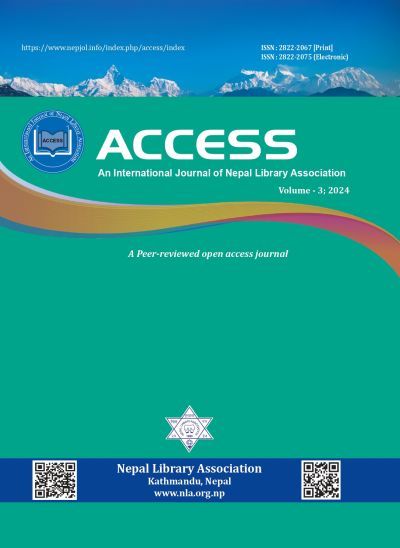ICT Proficiency in Library and Information Science Professionals: A Systematic Review
DOI:
https://doi.org/10.3126/access.v3i1.69423Keywords:
Trainings, Skills and competencies, Professional development program, LIS professionals, Libraries, PDP, Library services, ICT skillsAbstract
Purpose: The proficiency of ICT-skilled and competent personnel plays a crucial role in delivering library services to globally connected users. However, amidst rapidly evolving technological landscapes and the diverse perceptions of hybrid users, Library and Information Science (LIS) professionals face the challenge of keeping pace with their communities' and institutions' expected ICT competencies. Additionally, there is a growing need for LIS professionals to possess diverse skill sets and competencies. Thus, this research aims to explore LIS professionals' ICT skills and competencies across various dimensions through a comprehensive literature review.
Design/methodology/approach: - This study utilized a systematic literature review (SLR) following the PRISMA framework. Three major databases (Scopus, Web of Science, and Pro Quest LISA) were selected for data collection. 2114 articles were initially identified using a Boolean search strategy, supplemented by 05 articles from the researcher's collection from 2020 to March 2024. Subsequently, 21 research articles were meticulously selected based on predefined inclusion and exclusion criteria. End Note online and MS Excel were employed for efficient article screening.
Findings: - Most selected articles predominantly employed quantitative research methodologies, often questionnaire instruments. Notably, contributions from Nigeria and Pakistan, along with the journal Library Philosophy and Practice, stood out in terms of research output. While most LIS professionals demonstrate proficiency in basic computer operations and digital literacy, a notable deficiency in advanced ICT skills is crucial for contemporary library services. Common avenues for skill enhancement include participation in conferences, workshops, training sessions, and seminars. However, several obstacles hinder skill development, including limited funding, lack of organizational support, inadequate training opportunities, subpar infrastructure, absence of policies, time constraints, and passive attitudes among staff. Notably, there is a pronounced need for training in technology management for intelligent libraries. Continuous Education Programs (CEP) and Professional Development Programs (PDP) enhance overall staff proficiency, underscoring the importance of organizational support in facilitating skill development initiatives.
Research limitations/implications: - This study is limited by the selection of databases and the predefined search criteria. However, it provides valuable insights into LIS professionals' current status, skills, and competencies, thereby guiding the identification of areas requiring targeted training interventions.
Originality: - By shedding light on LIS professionals' ICT skills and competencies, this study serves as a valuable resource for assessing training needs and informing strategic interventions to enhance library personnel's capabilities.
Downloads
Downloads
Published
How to Cite
Issue
Section
License

This work is licensed under a Creative Commons Attribution-NonCommercial 4.0 International License.




